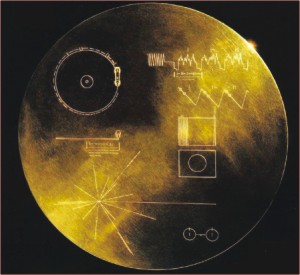Science Feature

Is anybody out there to listen to Bangla?
The interstellar mission Voyager is carrying a greetings message in Bangla, among others, for the sky dwellers. It is: “Namaskar! Bishye Shanti Hok.” (Hello! Let there be peace everywhere.) We do not know whether anybody is out there to listen to the Bangla message. Neither do we know whether they will be able to play the recording and understand the message even if some are there in any form. In messaging, practically we are entangled with manifold uncertainty: existential, biological and technological, aside from the linguistic problem itself.
 That aliens live on any planet in any corner of the universe is immeasurably uncertain. So far there is no evidence that there is life elsewhere. Powerful telescopes are going on discovering planets around the remote stars, but life is yet to be discovered there. Among the billions of stars in the sky, it is difficult to find which have liveable planets around them. We have already completed our cursory probe in all the planets of our solar system, but no animals were found there. So how can we be certain that animals exist somewhere else. Life seems to be a real rarity in the universe. Are we then alone in the vast space? That aliens live on any planet in any corner of the universe is immeasurably uncertain. So far there is no evidence that there is life elsewhere. Powerful telescopes are going on discovering planets around the remote stars, but life is yet to be discovered there. Among the billions of stars in the sky, it is difficult to find which have liveable planets around them. We have already completed our cursory probe in all the planets of our solar system, but no animals were found there. So how can we be certain that animals exist somewhere else. Life seems to be a real rarity in the universe. Are we then alone in the vast space?
We can only conjecture that there is extraterrestrial life or ET, in absence of any concrete proof. Some scientists really believe in the existence of ET. They calculate the probability of their existence with mathematics and physics. But if they are there, what will be their biological characteristics? We humans here, scientists say, have got our present shape from billions of years' biological evolution. What is the guarantee that life over there have evolved in the same way as here? It is almost impossible, given different cosmological history of different space locations. If they have different physical and mental properties, we cannot expect that they will be able to understand our language?
We even on earth do not understand the language of one another if not trained in it? It becomes possible for different language communities on earth to communicate among themselves because they learn multiple languages, one as mother tongue and others as second or foreign ones. Earthly languages carry some universal properties firstly because they historically share common origins and secondly because human beings share same genealogical history and hence possess same physical/ psychological/cognitive faculty, which facilitates mutual communication. Springing from very dissimilar origins with even dissimilar properties may render communication virtually impossible.
Moreover, there is the problem of technology. Here on earth we have developed technology according to our own needs. Given far alien needs, the technology must be poles apart. The technology we use here to record our sounds and playing them may be totally different elsewhere. Or they may not have such a technology at all. If they are at the stage of civilisation earlier than us, their technology will be primitive; and if they are at any advanced stage of civilisation, our recording technology is archaic enough to be found in their museum. In both of the cases communication will collapse. For deciphering message, the aliens need to have similar technology. But the possibility seems to be very remote, like the dimly blinking star at the farthest corner of the sky.
So who is going to listen to our greetings imprinted in the Golden Record on the Voyager? It is indeed a far-fetched possibility that any creatures in the sky will read Bangla and other languages sent together.
Greetings were given in 55 different languages including English, French, Spanish, Russian, Italian, German, Arabic, Persian, Japanese, Mandarin Chinese and all other major languages of the world. The list also included the classical dead languages like Greek, Latin, Sumerian, Akkadian and Hittite. From the subcontinent, it included (Bangla apart) Urdu, Hindi, Telugu, Oriya, Punjabi, Gujarati, Marathi, Kannada and Rajasthani. But who are going to read all those languages? All greetings in vain, then?
In 2007 the world celebrated three decades of Voyager exploration. There were two of them -- Voyager 1 and Voyager 2, launched by NASA in 1977. Lasting far beyond their projected five-year mission, both spacecraft still send back data to contribute to our knowledge about space. The spacecraft are now travelling beyond any previous points of exploration. At present Voyager 1 with Voyager 2 at its heels is crossing an area about 8.7 billion miles from the sun. Although they are aging, the twins have power until the year 2020 to remain operative. It is supposed to take forty thousand years before they make a close approach to any other planetary system.
Both of them carried a Golden Record. It is a phonograph record -- a 12-inch gold-plated copper disk, containing different sounds and 115 images selected to portray the diversity of life and culture on Earth. A variety of natural sounds such as those made by surf, wind and thunder, birds, whales, and other animals were recorded. Each record is encased in a protective aluminium jacket, together with a cartridge and a needle. Instructions, in symbolic language, explain the origin of the spacecraft and indicate how the record is to be played. The audio part contains music from different cultures alongside greetings of languages. The music is an eclectic 90-minute selection, including both Eastern and Western classics and a variety of ethnic ones.
Dr Carl Sagan, chairman of the selection committee for Voyager recording, noted during launching, “The spacecraft will be encountered and the record played only if there are advanced spacefaring civilisations in interstellar space. But the launching of this bottle into the cosmic ocean says something very hopeful about life on this planet.” Let the dream of Sagan come true. Let's hope our records will be played by the sky dwellers, to be thrilled with our greetings and enthralled with our music. In that case, Bangla will not go amiss, surely!
The writer is an Assistant Professor, English, Bangladesh University. Email: binoy_barman@yahoo.com
|
